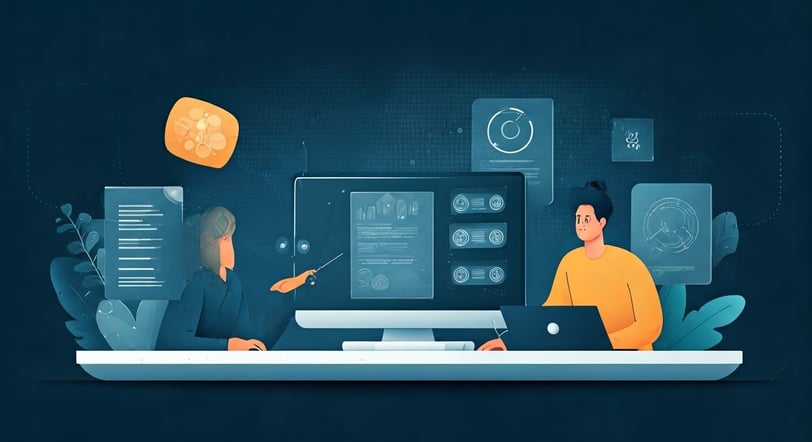
Top Skills for IT Staff Augmentation in 2025 and Beyond
The importance of IT staff augmentation is growing as industries adapt to digital transformation. This change helps companies meet specific project needs in a tough market. By working with outsourced experts, businesses can fill skill gaps and move closer to their goals quickly. IT professionals with strong technical skills and important soft skills are key to success in this changing setup. As digital systems change, choosing the right talent helps organizations keep up with trends and stay flexible in fast-changing environments.
IT STAFF AUGMENTATION SERVICES
Key Highlights
IT staff augmentation bridges talent gaps, delivering specialized skills for specific projects.
Top technical skills in demand include advanced programming, cloud computing, and cybersecurity.
Soft skills like adaptability, communication, and collaboration remain crucial for team efficiency.
Emerging technologies such as AI, IoT, and blockchain influence the required skillsets.
Businesses increasingly turn to staff augmentation to minimize costs and access elite tech talent.
Augmented staff boosts productivity, enabling companies to navigate the competitive market effectively.
Introduction
The importance of IT staff augmentation is growing as industries adapt to digital transformation. This change helps companies meet specific project needs in a tough market. By working with outsourced experts, businesses can fill skill gaps and move closer to their goals quickly. IT professionals with strong technical skills and important soft skills are key to success in this changing setup. As digital systems change, choosing the right talent helps organizations keep up with trends and stay flexible in fast-changing environments.
Most In-Demand Skills for IT Staff Augmentation in 2025 and Beyond
The IT field in 2025 will focus on specialized skills that are needed to keep up with new technology and complicated projects. Skills in programming, knowledge of new web and mobile tech, and expertise in cloud computing will be very important. Also, using skills like AI, machine learning, and stronger cybersecurity will help projects succeed in the future. Soft skills like time management and adaptability will support technical skills. Together, they will create teams that focus on both innovation and working well together.
#1 Advanced Programming Languages
Advanced programming languages will remain important for IT staff augmentation in 2025. These skills help businesses build, improve, and keep complex systems running. Python is the top choice; its ability to scale, easy-to-read code, and large library support make it great for web applications and projects that require a lot of data. At the same time, JavaScript is changing web development by being flexible for both front-end and server-side applications.
Java stays popular because it works on different platforms and helps manage enterprise applications. It is key for Android development and online shopping platforms. On the other hand, C# helps integrate with Microsoft products like Azure and supports game development with tools like Unity.
Programming professionals are crucial for providing effective tech solutions, meeting market demands, and driving innovation. Teams that use these languages can implement projects smoothly for clients while solving problems well. This shows how important skilled IT staff augmentation is in competitive industries.
#2 Emerging Web Technologies
Web development is changing fast. New web technologies are important skills for growing in IT. Professionals who are good at making modern web applications help businesses create experiences that are responsive and have many features. Front-end developers need to be skilled in HTML, CSS, and JavaScript. They should also follow rules for accessibility and responsive design. For example, using alt tags can help make websites more inclusive and improve user interaction.
Back-end developers focus on server-side programming languages like Python, PHP, and Ruby. They also need to know databases like MongoDB and PostgreSQL. They work closely with front-end developers to ensure everything works well together using APIs.
Skills for web maintenance: API development, accessibility compliance, security measures
Future considerations: Leveraging innovative frameworks
By focusing on user interaction and growth, web technologies are key for helping businesses go beyond what users expect in a competitive online world. Having dedicated augmented staff helps ensure strong and specialized deployment.
#3 Next-Gen Mobile App Development
The need for mobile app developers is growing. IT professionals who know how to develop software for both iOS and Android are more important than ever. iOS developers must be good at Swift. This helps them use Apple tools like UIKit and Zcode to keep up with what customers want.
On the other side, Android app developers need to be skilled in Java and Kotlin. They also use Google's tools and Android Studio to create and improve their apps. Mobile apps are used in many industries, like retail and healthcare, showing how useful they can be.
Having a mobile-first approach means being quick in development and deployment. This knowledge is crucial for IT staff augmentation services. Professionals with strong technical skills help to smoothly add applications to projects. They assist companies in keeping an edge in a mobile-focused digital world.
#4 Cutting-edge Cloud Computing and DevOps Practices
Cloud platforms and DevOps principles are now essential for IT operations. They offer flexible solutions for businesses. With knowledge of cloud computing, teams can use tools like AWS, Microsoft Azure, and Google Cloud Platform. This helps make networking, storage, and database services smoother.
DevOps principles improve the development cycle. They combine IT operations with software development for faster and better results. Important practices include CI/CD for ongoing improvements and updates, containerization, and monitoring tools. These ensure that systems work well and reliably.
Organizations that have augmented staff with skills in both cloud and DevOps can handle tech projects accurately and flexibly. Focusing on these practices helps connect development efforts with business goals effectively. This brings strategic benefits in today's linked IT environment.
#5 Enhanced Cybersecurity Measures
Cybersecurity skills are essential for IT professionals. Cyber threats change quickly, so it is crucial to keep up. To protect business environments, network security must follow secure design rules. It also needs firewalls, VPNs, and systems to detect intrusions in real time.
To keep software secure, good coding practices are necessary. These practices help stop vulnerabilities during software development. Using frameworks like OWASP and ISO 27001 builds strong security foundations. Vulnerability assessments and penetration testing are important. They help find and fix risks before problems happen.
Having augmented staff with cybersecurity skills helps businesses stay running and keep data safe. This builds trust in technology-based operations. These experts are key in protecting against breaches, keeping networks and applications safe with smart strategies.
#6 AI and Machine Learning Integration
Artificial intelligence and machine learning are transforming how businesses find new opportunities through tech innovation. With AI, businesses can automate repetitive jobs, making work more efficient in many areas. Machine learning helps firms get useful insights from data, changing how they make decisions.
AI applications include predictive modeling in finance and chatbots for customer service. Professionals with deep learning skills are key to building systems for image recognition and natural language processing.
IT staff augmentation with AI experts helps companies enter markets with smart customization. By using these advanced technologies, organizations gain helpful tools that improve customer connections and reach their business goals.
#7 Big Data and Analytics
Big data is very important in today's industries. It makes analytics a key skill for IT professionals. Staff members who understand data analytics help businesses find trends, predict customer actions, and understand their competition better.
Experts with skills in tools like Apache Hadoop, Spark, and SQL databases are crucial for handling large data sets effectively. Using big data along with machine learning makes it easier to gain valuable insights that can drive growth.
Analytics experts support data-driven plans. This helps companies make better decisions and become more flexible. IT support ensures that businesses can access the right data science talent. This allows them to take advantage of big data's power for success in the future.
#8 IoT Integration
The Internet of Things (IoT) connects different devices, allowing them to talk to each other easily. This connection helps create new ideas in many industries. IoT professionals work in expanded teams. They design and set up solutions to handle issues like growth and device compatibility.
They use programming and network systems to create connected setups. These range from smart home devices to monitoring tools in factories. Keeping these devices safe is very important because IoT devices can be attacked from the outside.
Having the right skills in IoT connection is key for making tech projects successful. Knowing how to use sensors and make platforms work together helps businesses create new solutions that meet market demands.
#9 Blockchain Technology
Blockchain technology changes industries by providing a secure way to handle transactions without a central authority. Skilled workers, or augmented staff, understand blockchain concepts and create private networks for businesses.
Some applications are smart contracts that automate agreements in supply chains and healthcare systems. Blockchain developers use languages like Solidity to ensure data is clear and reduce fraud risks.
With growing market demands, having blockchain skills helps businesses use technology that is efficient, reliable, and transparent. This places organizations in a good position for success in the future.
#10 Soft Skills in a Digital Era
As the IT team's dynamics change, soft skills are very important. Skills like interpersonal abilities and adaptability help manage relationships between different teams. Clear and assertive communication helps in understanding tasks better. Working together in a collaborative way makes team interaction smoother.
Problem-solving is also key to fixing issues with workflow. Professionals who can handle debugging problems and adjust to shifting project requirements are better at dealing with changing situations. Time management makes sure that deadlines match up with milestones, keeping projects steady.
Staff who have strong soft skills work better together. This makes them valuable in reaching organizational goals in the IT sector.
Most Hired Roles in IT Staff Augmentation
In 2025, the IT staff augmentation scene will focus on bringing in skilled workers for important tech jobs. Developers will stand out in both frontend and backend tasks. They will have the needed skills to build websites and applications. Scrum Masters will help keep projects running smoothly by using agile methods. Also, managers who are well-versed in data science will make sure that data is handled properly. Companies that prioritize hiring for these positions through staff augmentation teams will enhance their outputs. This way, they can meet different team needs and long-term plans for talent.
1. Frontend & Backend Developers
Frontend developers create user interfaces using HTML, CSS, and modern JavaScript frameworks. At the same time, backend developers handle the smooth operation of systems with database management and API integration.
Working together, these roles ensure that platforms are both attractive and useful. They meet project needs and satisfy user expectations. This teamwork allows for easy shifts between design and technology, making development teams ready for various tasks.
In different industries, companies that hire developers gain better skills. This helps them provide great digital solutions that have a big impact on user experience.
2. Certified Scrum Master
Certified Scrum Masters are essential for project efficiency. They keep agile principles strong during the development cycle. This helps IT teams work better.
Scrum Masters improve team communication. They manage daily standups, track workflows, and assess project progress. Also, they ensure that initiatives match vision statements, which cuts down on unnecessary work.
In today’s companies, hiring Scrum Masters leads to real outcomes. They boost teamwork across different functions. Their skills help projects succeed in fast-paced industries.
3. Data Management Specialist
Data management specialists make analytical processes and resource planning easier. When data science is mixed with quality assurance, it helps teams use insights that can be acted on.
Industries like retail use data-driven surveys. Meanwhile, finance relies on AI-based predictive algorithms handled by these specialists. Their work is important. They turn raw data into valuable resources that organizations can use effectively.
Staff augmentation brings in experts who help scale up operations. They create structured data processes that are key for customizing how businesses engage with the market.
4. QA Specialist
QA specialists help keep software reliable and working well. They improve results by doing integration tests and using feedback from customers.
Experts in added teams find quality measures to check if applications meet goals. They carry out continuous improvement projects to match different project needs. Their skills play a big role in the success of technology for businesses that depend on quality checks.
In-Depth Analysis of Key Technical Skills
Technical skills are important for effectively using IT staff augmentation. Good programming skills meet key business needs, like automation or improving systems. Web technologies, such as adaptive scalable code, help make user experiences better, along with new mobile tools. Companies focused on AI look for machine learning experts to help them take action for the future.
Importance of Advanced Programming for Future Projects
Details will be shared soon. It focuses on connecting things in a clear order. This emphasizes getting ready step by step using important guidelines or models.
Web Technologies That Will Dominate the Market
Emerging web technologies are set to change how IT services are delivered. Key advancements like Progressive Web Apps (PWAs) and Single Page Applications (SPAs) are improving user experiences and lowering overhead costs. More people are relying on cloud computing platforms, especially Microsoft Azure. This helps speed up development cycles and allows for easy scaling. Frameworks like React and Angular play an important role in creating responsive web applications. They also help IT professionals close skill gaps. Understanding these technologies is important for teams that want to keep up with changing project demands.
Mobile Technologies Shaping the Next Decade
Advances in mobile technology will change IT staff augmentation over the next ten years. Better programming languages and frameworks will help create mobile apps quickly to meet specific project needs. Cloud computing services, such as Microsoft Azure, will make it easy to connect and expand mobile solutions. Also, as user experience becomes more important, there will be a need for skilled professionals who specialize in responsive design and mobile analytics. Using these technologies will help IT teams respond to changing market demands efficiently.
The Role of AI and Machine Learning in IT Augmentation
Using artificial intelligence and machine learning has changed the world of IT staff augmentation. These technologies help improve project processes. They allow teams to find skill gaps and match talent to project requirements more easily. By using data analytics, organizations can foresee their talent needs and improve their IT operations. This helps to smoothly integrate augmented staff into the team. Adopting AI-driven tools promotes continuous improvement. This boosts the productivity and effectiveness of development teams, while also lowering overhead costs and keeping up with market demands.
Navigating the Evolving Landscape of IT Augmentation
In the fast-changing world of IT, it's very important to adapt to change. IT professionals need to develop both technical skills and soft skills. This helps close skill gaps effectively. Focusing on interpersonal abilities, along with knowing programming languages, improves teamwork in development teams. A good staff augmentation partner is vital. They provide skilled professionals who meet project requirements. When teams value innovation and work on continuous improvement, IT staff can deal better with market demands. This way, they can deliver high-quality IT services focused on new technologies.
Strategies for Upgrading Team Capabilities
Finding the right strategies is very important for improving team skills in IT staff augmentation. Focused training programs and mentorship help close skill gaps. This ensures team members stay skilled in new technologies. Promoting teamwork builds vital interpersonal abilities. It also boosts communication and knowledge sharing. Using feedback from performance reviews allows for a custom plan for each person's growth. This helps align their skills with what the project demands. Additionally, building a culture of innovation helps teams adjust quickly to changing market needs.
Best Practices for Integrating Advanced Tech Skills
Successful IT staff augmentation relies on adding advanced tech skills to development teams. Focused efforts on continuous improvement help organizations fill skill gaps and meet market demands. By creating a teamwork-focused environment, companies promote knowledge sharing, which helps develop technical and interpersonal abilities. Regular training programs on the newest programming languages and emerging technologies keep the right talent ready for changing project requirements. Working with a skilled staff augmentation partner can boost the team's ability to handle complex tech projects more effectively.
Conclusion
In summary, to navigate the world of IT staff augmentation, it is important to have a smart plan. This plan should focus on both technical skills and important soft skills. Many companies are facing a lack of skilled workers and changing market demands. That's why working with experienced staff augmentation partners is so important. Putting money into ongoing improvement and using new technologies can help teams work better and boost efficiency. By fixing skill gaps and adjusting to project needs, companies can stay competitive in the fast-changing IT sector. This will help them reach their business goals.









